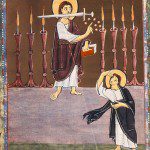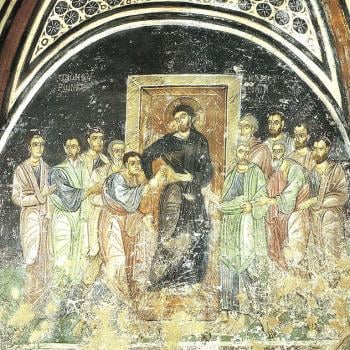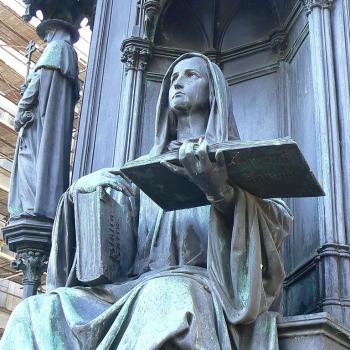![Head of Virgin Mary By Римский мастер первой половины XIII века [Public domain], via Wikimedia Commons](https://wp-media.patheos.com/blogs/sites/637/2016/04/Head_of_Virgin_Mary_from_Old_Saint_Peters_Basilica_13th_c._Pushkin_museum-2-264x300.jpg)
By Римский мастер первой половины XIII века [Public domain], via Wikimedia Commons
After exploring the way Mary is to be seen as the Second Eve, we must now deal with the previously asked question, how are we to understand Jesus’s relationship with his mother after the way he seemingly undermined familial relationships by saying his family are those who do the will of God the Father (Matt. 12:46 -50)?[1]
If we were to take the text as if Jesus were showing some sort of disrespect to his mother, we would undermine his work in the world, for it would mean that he did not fulfill the Law of Moses. Not only would this mean he could not be the messiah, it would also mean that he lied when he said that he came to fulfill the law, not abolish it (cf. Matt. 5:17). Rather than showing disrespect for his mother, he used the occasion to explain something about his relationship to humanity, about the common family we are to become following him, using his own earthly family as the prime example of that relationship.
His words, which talk about the mystical or spiritual relationship he is to have with him as his followers, are fulfilled in and with her in a unique way. She truly is the one who fulfilled the will of the Father; she is the representation of humanity which gives itself entirely over to the Father, reversing the error of Eve and so answering “Yes” to the Word of God. For her, Jesus’ words serve as encouragement, reminding her to continue to live a life worthy of her vocation as the New Eve, to continue following the will of the Father in all things so that she can continue to be worthy of the honor the Father gave her by allowing her to be the Mother of God the Word. St. John Chrysostom, therefore, indicated that we must not read what Jesus said as a rebuke or a denigration of Mary, but the opposite, an exhortation to take her from the greatness she had already obtained to further greatness, following him as her God and Lord:
This is why He said, “Who is My mother and My brethren?” Not to insult her who had borne Him, (away with the thought!) but to procure her the greatest benefit, and not to let her think meanly of Him. For if He cared for others, and used every means to implant in them a becoming opinion of Himself, much more would He do so in the case of His mother. And since it was probable that if these words had been addressed to her by her Son, she would not readily have chosen even then to be convinced, but would in all cases have claimed the superiority as being His mother, therefore He replied as He did to them who spake to Him; otherwise He could not have led up her thoughts from His present lowliness to His future exaltation, had she expected that she should always be honored by Him as by a son, and not that He should come as her Master. [2]
Thus we must read his words, not as a sign of disregard or disrespect for his mother, but rather the exact opposite. It shows that he cares and loves for his mother enough to continue to minister to her, to not neglect her and her needs, and yet he is able to do it in a way which he could help her and all those around him at the same time. It highlights his wisdom. He was able to skillfully teach many people at the same time, with one set of words which could be and were expected to be interpreted by each according to their own particular spiritual needs. Indeed, it is important to understand that the simple meaning which is often overlooked was also something Jesus wanted his followers to realize: his mother and step-brothers and step-sisters, his earthly family, were fit to be his earthly family because they were among those who did the will of God.
Jesus affirmed the holiness of his family. By using them as an example of what it means to be holy, he encouraged the rest of us to join in and be in his spiritual family. It is proper to realize this further intent behind his words. He wants us to follow the will of the Father and so become worthy of being adopted into his spiritual family. Indeed, we are called to emulate his earthly family and what they did. This is not limited to his step-family, but also, and including, his Mother. We can give birth to God the Word in our lives, not in the physical fashion of Mary, but in a spiritual form. We are to give birth to God in our soul, and in this way, Meister Eckhart suggested, become imitators of Mary:
God in things is activity, reality, and power, but in the soul he is procreative. For creatures are only God’s footprints, but by nature, the soul is patterned after God himself. This pattern must be adorned and fulfilled by divine conception and no other creature except the soul is adapted to such a function. In fact, whatever the perfection that may come to the soul, let it be divine light, or grace, or any other blessing, it cannot come except by birth. No other way is possible. Cherish in yourself the birth of God, and with it all goodness and comfort, all rapture, reality, and truth will be yours. Reject it and you reject all goodness and blessing; but given the birth of God, whatever comes your way will bring with it unsullied reality and stability. Whatever you try to get without it will come to nothing, try how you will. It alone gives blessing. All else corrupts.[3]
Like what happened with Mary, the birth of the Son in our soul is God’s prerogative. It is grace which we allows all of us, men and women alike, to become, as it were, spiritual mothers to God the Word. God works in the soul which opens itself up to him. It does this by becoming the passive component to God’s activity. “This work [birth], when it is perfect, will be due solely to God’s action while you have been passive. If you really forsake your own knowledge and will, then surely and gladly God will enter with his knowledge shining clearly.”[4] This is why Jesus can call anyone who does the will of his Father his mother, even as such a soul, because it is a joint heir with him (Rom 8:17), is to be seen as his brother or sister. If we love him, we give birth to him in our lives, even as we also find ourselves joined with him in eternity, receiving the eternal glory as our inheritance from the Father. Nothing in his words, therefore, disregards his earthly mother, brothers and sisters, and to read such into them is to ignore the point, where their lives are to serve as examples to us. In and through them and what they have done we can see how exalted we can become because of him. What they have done is great because, as Jesus indicated, they followed the will of the Father for their lives. His words should not be seen as some rejection of his earthly family, but rather, as encouragement for us to be like them if we want to receive the glory which they have received and which awaits us if we, too, find ourselves welcomed into the family of God though Jesus.
[1] “While he was still speaking to the people, behold, his mother and his brothers stood outside, asking to speak to him. But he replied to the man who told him, “Who is my mother, and who are my brothers?” And stretching out his hand toward his disciples, he said, “Here are my mother and my brothers! For whoever does the will of my Father in heaven is my brother, and sister, and mother”” (Matt. 12:46- 50 RSV).
[2] St. John Chrysostom, Homilies on St. John in NPNF1(14): 74.
[3] Meister Eckhart, “This is Another Sermon” in Meister Eckhart: A Modern Translation. trans. Raymond B. Blakney (New York: Harper & Row Publishers, 1941), 103.
[4] Meister Eckhart, “Eternal Birth” in Meister Eckhart: A Modern Translation. trans. Raymond B. Blakney (New York: Harper & Row Publishers, 1941),” 119.
Stay in touch! Like A Little Bit of Nothing on Facebook:
A Little Bit of Nothing













